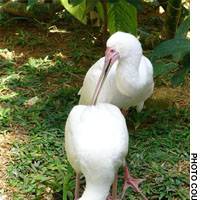* Japanese name: Herasagi
* Scientific name: Platalea leucorodia
* Description: Spoonbills are tall white birds with long legs, similar to egrets, but fatter. The legs vary from pink-gray to black. They have a defining characteristic: a long black bill that forms a spoon shape at the end. The body grows up to 90 cm long. In flight they extend the neck and legs. Juvenile birds have some black tips to the primary flight feathers, and adults in the breeding season develop a yellow collar on the breast and a yellow patch on the tip of the bill. They are largely silent, but do utter the occasional grunt.
* Where to find them: Spoonbills are water birds found on coastal rivers, lakes and estuaries, as well as along sheltered rivers and marshes inland. They prefer habitats with reed beds to provide cover, and they nest in colonies, sometimes with other water birds such as herons and egrets. Water pollution and the degrading of their habitat has led to a fall in numbers across Japan.
* Food: Aquatic insects (and insect larvae), crustaceans, amphibians, reptiles, worms, leeches and small fish. The feeding method of spoonbills is unique and distinctive: They sweep their long bills side to side through shallow water, snapping them shut when they feel a prey item. The inside of the spoon-shaped bill is covered with sensory cells that can detect food. Even so, the method doesn't appear to be very efficient: Spoonbills must spend most of each day feeding in order to collect enough and sometimes they are forced to eat plant material.
* Special features: Spoonbills form a pair bond, but it only lasts one season. During that time they are apparently faithful, and both the male and the female cooperate to incubate the eggs (usually three per clutch) and to feed the young (by regurgitation). There is a division of labor: The male collects sticks for use as nest material and the female constructs the nest, weaving the sticks into a bowl shape. However, it isn't all domestic bliss. It is hard to find enough food to raise the chicks and in many cases one or more chick will die of starvation. Once the chicks have fledged, the mother and father split up. Next season they take different partners.
39 mins ago

















With your current subscription plan you can comment on stories. However, before writing your first comment, please create a display name in the Profile section of your subscriber account page.